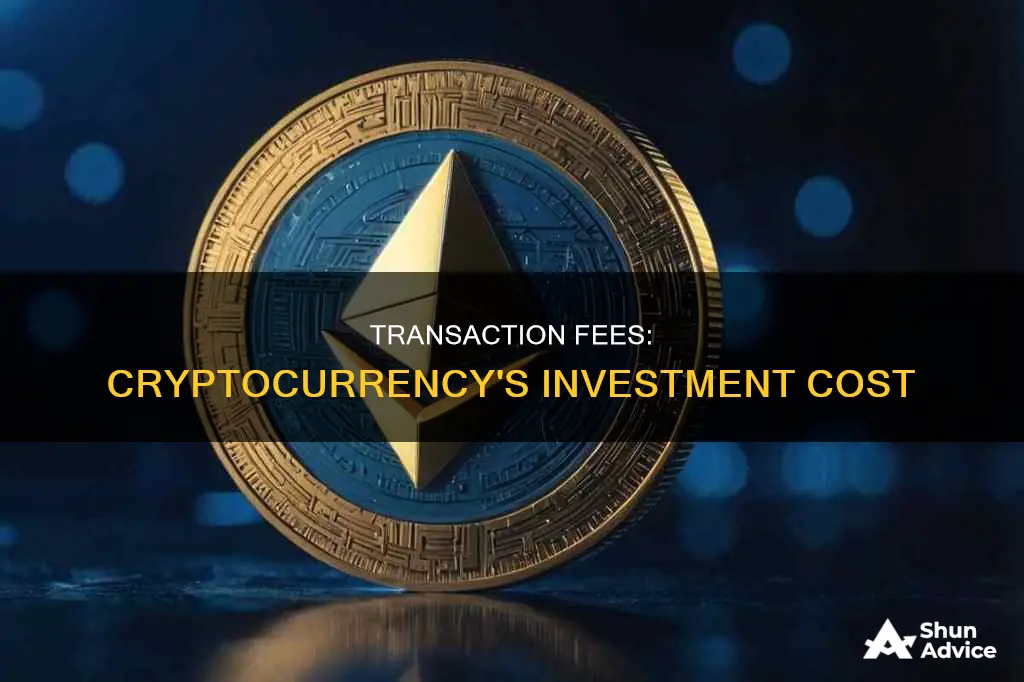
Transaction fees are an inevitable part of investing in cryptocurrency. These fees are paid when cryptocurrencies are transferred to another wallet, and they vary depending on the platform and type of transaction. For example, some platforms charge deposit and withdrawal fees, while others have tiered fee structures that reward users for their trading volume. It's important to do your research and understand the different fee structures to make informed investment decisions. While some platforms offer commission-free trading, they may make up for it in other ways, so it's crucial to be strategic about your transactions and choose the right platform for your needs.
| Characteristics | Values |
|---|---|
| When are transaction fees paid? | When cryptocurrencies are bought, sold, or transferred to another wallet. |
| Why do transaction fees exist? | To compensate miners and validators for their efforts in keeping the blockchain network running smoothly. |
| How do transaction fees work? | Fees incentivize miners to prioritize transactions with higher fees and add them to the next block in the blockchain. |
| How much are the fees? | The fees vary depending on the platform and the type of transaction. They can range from a few cents to a few dollars or even thousands of dollars during periods of high network congestion. |
| How can crypto investors minimize fees? | By choosing the right platform, timing their transactions, using coins instead of fiat currency, and being strategic about transaction types and amounts. |
What You'll Learn
- Transaction fees are necessary to keep blockchain networks secure and sustainable
- Transaction fees vary depending on the platform and type of cryptocurrency
- Transaction fees can be minimised by choosing the right time to trade
- Some platforms offer commission-free trading to reduce costs
- Transaction fees are influenced by the size of the transaction and demand for block space

Transaction fees are necessary to keep blockchain networks secure and sustainable
Transaction fees are an integral part of the blockchain system, and they serve multiple purposes. Firstly, they act as an incentive for miners to validate transactions and maintain the network. Miners play a crucial role in the blockchain ecosystem by providing their computational power to verify and record transactions. The fees they receive compensate for their efforts and resources, encouraging them to continue supporting the network.
Secondly, transaction fees help ensure the security and sustainability of blockchain networks. By requiring a small fee for each transaction, the network can prevent spam and malicious activities. Without transaction fees, the network could be flooded with pointless or harmful transactions, disrupting its operations. The fees act as a deterrent, reducing the likelihood of spam attacks and protecting the network's integrity.
Additionally, transaction fees contribute to the decentralised nature of blockchain technology. Unlike centralised payment systems that charge a processing fee, blockchain networks rely on miners to validate transactions. The fees paid by users cover the operating costs of these miners, ensuring that the network remains decentralised and accessible to all users.
The transaction fee structure also allows users to have some control over the validation process. By setting a higher fee, users can incentivise miners to prioritise their transactions, resulting in faster processing times. On the other hand, users who are willing to wait longer can set lower fees or even opt for zero fees in some cases.
Lastly, transaction fees are closely linked to the mining process and act as rewards for miners. In the case of Bitcoin, for example, miners receive all the transaction fees in the block they validate, along with an additional incentive of newly minted coins. This block reward provides further motivation for miners to participate in the network and maintain its functionality.
Loser Coin: Is It a Smart Investment Choice?
You may want to see also

Transaction fees vary depending on the platform and type of cryptocurrency
Transaction fees are an inevitable part of the cryptocurrency landscape. These fees are paid whenever someone buys, sells, or invests in a crypto product, and they can vary depending on the platform and the type of cryptocurrency. While some platforms offer fee-free services, others charge a range of fees for different transactions. Understanding these fees is crucial for anyone looking to invest in cryptocurrencies.
Types of Crypto Exchange Fees
There are several types of fees that cryptocurrency exchanges may charge, each serving a unique purpose:
- Network fees: These fees occur during cryptocurrency transactions when crypto is transferred from one digital wallet to another. They are paid to miners and validators as compensation for the computational resources and energy required to validate and record transactions on the blockchain.
- Miner fees: These fees are paid to support the costs of mining cryptocurrency, including the massive amount of power used in the mining process.
- Service fees: These are charged by third-party applications, such as Coinbase, when users buy or sell cryptocurrency on their platform. Service fees vary depending on the platform's size and the current market state.
- Deposit and withdrawal fees: These fees arise when someone adds or removes funds from their crypto account. While most exchanges do not charge for deposits, almost all exchanges charge users to withdraw.
Factors Affecting Transaction Fee Sizes
The size of a transaction fee is influenced by two main factors:
- Transaction size: Larger transactions take up more space in a block and thus require a higher fee.
- Demand for block space: When there are many users sending crypto funds simultaneously, the demand for block space increases, leading to potential network congestion and higher fees.
Transaction Fees on Different Platforms
Transaction fees can vary significantly depending on the platform:
- Binance: Binance offers a tiered fee structure that rewards users for their trading volume and holdings of their native cryptocurrency, Binance Coin (BNB). The more you trade and the more BNB you hold, the lower your trading fees. Withdrawal fees on Binance are also adjusted dynamically based on the network's condition.
- Coinbase: Coinbase charges fees for certain cash-out methods and has a fee structure based on 30-day trading volume, with higher volume resulting in lower fees.
- Robinhood: Robinhood offers commission-free trading on crypto, making it one of the cheapest platforms. However, they make money by routing orders to market makers and selling crypto tokens at slightly inflated prices.
- EToro: eToro is another platform that offers fee-free services, helping to reduce overall trading expenses.
- Crypto.com: Crypto.com does not charge any fees or have limits for depositing crypto onto their exchange. However, withdrawals incur a fee as they are on-chain transactions.
Bitcoin Gold: A Smart Investment Move?
You may want to see also

Transaction fees can be minimised by choosing the right time to trade
When trading cryptocurrency, transaction fees are inevitable. These fees are incurred whenever you buy, sell, or invest in a crypto product. They can vary depending on the type of transaction, the platform used, and the volume of trades. However, there are ways to minimise these fees by choosing the right time to trade.
Firstly, it is important to monitor network congestion and transaction fees in real-time. Fees tend to be lower during periods of low network activity. By timing your transactions strategically, you can take advantage of lower fees. Additionally, choosing off-peak times for transactions can help reduce network fees, which are influenced by network congestion.
Another strategy is to explore alternative cryptocurrencies or networks with lower transaction fees. Different platforms have varying fee structures, so it is worth comparing options to find those that align with your needs. Some platforms, like Robinhood, eToro, and BlockFi, offer fee-free services, significantly reducing overall trading expenses.
Furthermore, certain exchanges provide lower fees for specific types of trades or users. For example, “Makers” on Binance who use limit orders that take longer to execute are charged lower transaction fees than “Takers” who use market orders. Additionally, some exchanges offer discounted fees for customers who hold certain cryptocurrencies or participate in promotions or rewards programs.
Lastly, consider using decentralised exchanges, which cut out the middleman and allow for peer-to-peer crypto swaps at low fees. Examples include Uniswap and PancakeSwap, which charge flat fees of 0.3% and 0.25%, respectively.
By implementing these strategies and choosing the right time to trade, you can effectively minimise transaction fees and enhance your overall investment returns in the cryptocurrency market.
Investing in Bitcoin: Is $2000 a Good Start?
You may want to see also

Some platforms offer commission-free trading to reduce costs
When it comes to investing in cryptocurrencies, transaction fees are inevitable. These fees are charged by the cryptocurrency exchange to facilitate the buying, selling, or transferring of digital currencies. While these fees are typically low, they can add up over time, especially for active traders.
To reduce costs, some platforms offer commission-free trading, providing an attractive alternative to traditional exchanges. These platforms generate revenue through alternative means, such as money makers in the market and other forms of trading. While truly free platforms are rare, several options offer very low-cost or discounted trading fees. For example, some exchanges provide volume-based discounts, where higher trading volumes result in lower fees. Others may offer promotions or special benefits for high-volume traders, such as zero-fee trading for specific assets or trading pairs.
One popular platform that offers commission-free trading is Robinhood. With Robinhood, investors can trade cryptocurrencies with no commissions, making it an attractive option for those looking to minimize costs. However, it's important to note that other fees may apply outside of commissions. Additionally, Robinhood does not offer mutual funds or bonds, and users rely on their knowledge when building their portfolios.
Another platform that often features on lists of commission-free trading platforms is Bybit. Bybit is a cryptocurrency exchange that offers a robust spot market and derivatives trading. Their fee structure is volume-based, with higher trading volumes resulting in lower fees. For high-volume derivatives market makers, Bybit offers zero trading fees, making it a compelling choice for experienced crypto traders. Bybit also provides a broad selection of cryptocurrencies, excellent security measures, and a user-friendly platform.
Coinbase, one of the most widely used exchange platforms, also offers commission-free trading for high-volume traders and members of their subscription product, Coinbase One. While Coinbase's initial trading fees are relatively high, ranging from 0.4% to 0.6% for makers and takers, respectively, these fees can be reduced significantly by increasing trading volume. Additionally, Coinbase One subscribers can trade with zero fees for a monthly subscription fee. However, it's worth noting that this option is currently only available to US-based users.
Kraken is another well-known platform that offers zero-fee trading for high-volume traders. Their fees range from 0% to 0.4%, depending on the trading volume and whether the user is buying or selling. Kraken also provides advanced trading features, such as margin trading and futures trading, and has a strong focus on security, making it an attractive option for traders of all skill levels.
Overall, while completely free platforms are challenging to find, several options offer commission-free trading or significantly discounted fees. These platforms can help minimize costs for investors, especially those who trade frequently. However, it's important to consider other factors besides fees, such as security, ease of use, the range of cryptocurrencies offered, and customer support, to make an informed decision when choosing a platform.
Finding the Right Coins: A Guide to Crypto Investing
You may want to see also

Transaction fees are influenced by the size of the transaction and demand for block space
When it comes to cryptocurrency, transaction fees are an inevitable cost. These fees are influenced by several factors, including the size of the transaction and the demand for block space.
The size of a transaction refers to the amount of cryptocurrency being transferred from one wallet to another. Typically, larger transactions require more block space, which leads to higher fees. This is because the available space in a block is limited, and when there are many people exchanging currency simultaneously, the demand for block space increases. This results in a longer queue of transactions waiting to be validated, leading to higher fees.
The demand for block space is influenced by the number of transactions that need to be verified and the available network capacity. Different cryptocurrencies have different processing capacities, which affects the demand for block space. For example, Bitcoin can process around seven transactions per second, while Bitcoin Cash can handle about 116 transactions per second. When the demand for block space is high, the network can get congested, resulting in higher fees.
To optimise their transactions and minimise fees, crypto traders should consider the network congestion and choose times of low activity to make their trades. They can also explore alternative cryptocurrencies or networks with lower transaction fees. Additionally, the choice of platform can significantly impact the fees, as different platforms have varied fee structures.
In summary, transaction fees in the cryptocurrency market are influenced by a combination of factors, including the size of the transaction and the demand for block space. By understanding these factors, traders can make strategic decisions to reduce their overall trading expenses.
Smart Move or Risky Bet: Investing $10K in Bitcoin
You may want to see also







